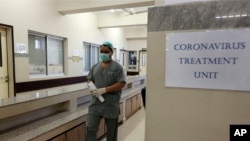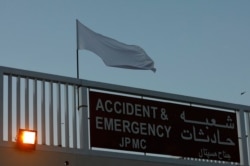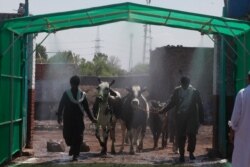Officials in Pakistan's largest city of Karachi have reported an unusual rise in the number of bodies being brought to hospitals and of patients dying due to "severe medical ailments" within a few hours of their arrival, suspecting the COVID-19 pandemic could be causing the fatalities.
The national tally of coronavirus infections as of Wednesday stood at around 6,400 and deaths at more than 110, including 41 in Sindh province, of which Karachi is the capital.
Seemi Jamali at the Jinnah Postgraduate Medical Centre (JPMC) in the port city said that in the last two weeks, at least 121 dead people were brought to the center and 99 others died within a couple of hours of their arrival at the hospital.
The cause of their deaths was "medical ailments," she said, while speaking to the private mainstream news channel ARY. This was happening just in one hospital in the city of more than 15 million people, noted the chief executive of the JPMC.
"But we have not been able to ascertain whether or not the patients had contracted coronavirus because relatives refused permission for doctors to carry out autopsies of the bodies," Jamali said.
She insisted, however, authorities needed to look into and collect data from all hospitals in Karachi to determine the cause of the rising number of fatalities.
Local media quoted provincial health officials as saying that the "most likely" causes of deaths ranged from chronic liver disease, multiple organ failure, cardiopulmonary arrest, pneumonia and even acute respiratory distress syndrome.
Provincial Chief Minister Murad Ali Shah, while addressing a news conference in Karachi, acknowledged "there are some deaths we feel are due to COVID-19 but they have not been confirmed."
Shah added that the burials for at least 15 such cases were carried out according to the guidelines specified for coronavirus victims.
He lamented many families were burying their loved ones in silence because of a lack of understanding about the guidelines for COVID-19 patients. They feared police would snatch away the body if they revealed the cause of the death, Shah added.
Faisal Edhi, who runs Pakistan's largest private ambulance service, said his rescue teams have collected several hundred bodies from private homes and different hospitals in Karachi in recent days for burial services.
Edhi told local media the numbers were "certainly higher and in some cases double" what his ambulances usually gathered during the same time period in the city prior to the outbreak.
"But the issue we face and the prevailing trend is that families are hiding facts and do not share actual reasons for the death of their loved ones with our staff," he said.
Lockdown
The Sindh government has imposed a complete lockdown for nearly a month to stem the spread of coronavirus. But elsewhere in Pakistan, including the national capital of Islamabad, a partial lockdown is in place.
Pakistani Prime Minister Imran Khan has maintained that a total lockdown of the country of 220 million people, where nearly 40% live below the poverty line, could lead to starvation of tens of millions of daily wage laborers and their families.
The federal government last week launched a financial relief package of nearly $1 billion to deliver about $70 each to roughly 12 million of the poorest families immediately affected by several weeks of restrictions on movements.
Khan on Tuesday extended the curbs on educational institutions and public gatherings for another two weeks. But he announced a gradual easing of restrictions on certain industries and businesses in Pakistan to revive employment opportunities for daily wagers, saying his cash-strapped government was unable to assist each and every poverty-stricken household while battling the COVID-19 pandemic.









